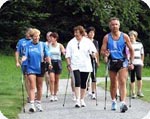|
|
Getting the Elderly back to Fittness
Its been a very cold winter and many elderly people have struggled through it with various attacks of cold, cough, fever and influenza. After this they feel so weak and tired that they are reluctant to get back into their exercise routines or walking. This sets off a vicious cycle of decrease in appetite and reduced desire to drink water. Finally you are left feeling weak, dehydrated, constipated and acidic.
 The good news is, so much is in our hands. It has to be mind over matter. Tell yourself that if you can brush your teeth and bathe in winter you can even walk, drink water and eat well through the next few months. The first step is to make sure you go for a walk, As far as possible try to make it happen in the morning but if this does not work, it can be midmorning, afternoon, evening, anytime, but don't go to bed at night, without having done your walk for the day. Even if you have to start by just walking around your living room, on your balcony or in your garden for the first few days, please make this start. The walk is the key – it makes you feel warmed up, muscles relax, giving a feeling of well being and strength, appetite increases, you feel thirsty and the whole body cycle starts moving smoothly. The good news is, so much is in our hands. It has to be mind over matter. Tell yourself that if you can brush your teeth and bathe in winter you can even walk, drink water and eat well through the next few months. The first step is to make sure you go for a walk, As far as possible try to make it happen in the morning but if this does not work, it can be midmorning, afternoon, evening, anytime, but don't go to bed at night, without having done your walk for the day. Even if you have to start by just walking around your living room, on your balcony or in your garden for the first few days, please make this start. The walk is the key – it makes you feel warmed up, muscles relax, giving a feeling of well being and strength, appetite increases, you feel thirsty and the whole body cycle starts moving smoothly.
Now to put your food right, first principle is to never skip a meal and never let a meal consists of just fruits, soups, milk or boiled veggies. Every meal must be a balance of carbohydrates like bread, rice, chapatti etc. and protein foods like milk, curd, dhal, egg, non-veg etc.
Elderly people need more protein to protect their bodies against muscle and tissue breakdown and loss with aging. This can be obtained by drinking 2-3 cups of skimmed milk or curds daily. Half a cup dhal or sambar or pulses are a must for lunch and dinner. One or two egg whites daily with breakfast or in a sandwich at tea or in any meal, is an excellent source of protein. A piece of fish or chicken at lunch is also a good idea.
Calcium is important as there is increased bone loss after age 50 and therefore milk or curds 2-3 glasses per day is a must for all elderly. Skimmed milk is ideal as it is not fattening. Iron requirements are more. A good supply of iron is got from eating balanced meals, therefore breakfast, lunch and dinner must be eaten and never skipped. Those with an iron deficiency problem can change from a rice diet to a wheat diet which is seen to improve the iron levels remarkably. Dhals and pulses also improve iron levels so please try to eat them at lunch and dinner. Just half a cup is necessary but try to include it in both meals. Also adding a fresh salad to lunch and dinner increases the vitamin B and C which will help in higher iron absorption from the food.
Vitamin B, C, and D are required in higher amounts as the absorption of these decreases with age and this can be obtained by eating 2 fruits, one at 11 am and at 6pm daily. Choose apple, pear, guava, pomegranate, oranges, and musambi as they are safe for even diabetics and contain plenty of fiber which will help to relieve constipation. A raw salad must be eaten daily at lunch and dinner. Dhal and pulses are also a rich source of vitamins. Besides all this drinking 2-3liters of water and walking 20-30 minutes daily will keep you fighting fit.
|
|